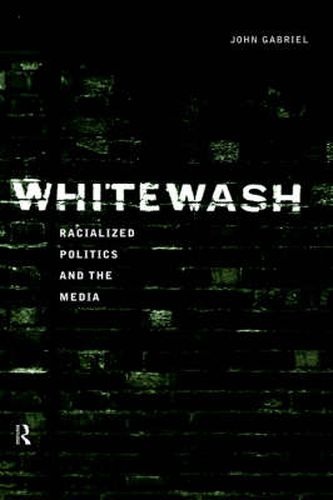Readings Newsletter
Become a Readings Member to make your shopping experience even easier.
Sign in or sign up for free!
You’re not far away from qualifying for FREE standard shipping within Australia
You’ve qualified for FREE standard shipping within Australia
The cart is loading…






This book puts the language used in television, the radio, the internet and press, as well as that spoken by key leaders, under the spotlight. It questions how these various mediums might be accused of constructing a language of white supremacy of ideas and politics. Taking specific examples and presenting new factual evidence, it studies the racial politics that lie behind much of the communication in the public arena, including that of minority factions and also the political and cultural mainstram. John Gabriel also describes and re-values the larger questions and debates surrounding the relationship between media communication and more general economic and political developments. Under chapter headings such as ‘Genealogies of Whiteness’ and ‘The Fringe and The Fabric’: The Politics of White Pride’ comparative case studies draw on contemporary political controversies and are used to explore the specific dynamics of the relationship between racialised forms of media discourse and political and economic change. What is ultimately revealed is the existence of a ‘white’ language, both coded and overt, which re-casts and re-invents dominant representations of whiteness. ‘Whitewash’ is a timely and controversial addition to a growing area of interest in sociological studies. It will therefore be essential reading to all media and racial politics students, as well as those wishing to know more about the hidden languages that seem to be increasingly invading the discourse of politics and the media.
$9.00 standard shipping within Australia
FREE standard shipping within Australia for orders over $100.00
Express & International shipping calculated at checkout
This book puts the language used in television, the radio, the internet and press, as well as that spoken by key leaders, under the spotlight. It questions how these various mediums might be accused of constructing a language of white supremacy of ideas and politics. Taking specific examples and presenting new factual evidence, it studies the racial politics that lie behind much of the communication in the public arena, including that of minority factions and also the political and cultural mainstram. John Gabriel also describes and re-values the larger questions and debates surrounding the relationship between media communication and more general economic and political developments. Under chapter headings such as ‘Genealogies of Whiteness’ and ‘The Fringe and The Fabric’: The Politics of White Pride’ comparative case studies draw on contemporary political controversies and are used to explore the specific dynamics of the relationship between racialised forms of media discourse and political and economic change. What is ultimately revealed is the existence of a ‘white’ language, both coded and overt, which re-casts and re-invents dominant representations of whiteness. ‘Whitewash’ is a timely and controversial addition to a growing area of interest in sociological studies. It will therefore be essential reading to all media and racial politics students, as well as those wishing to know more about the hidden languages that seem to be increasingly invading the discourse of politics and the media.